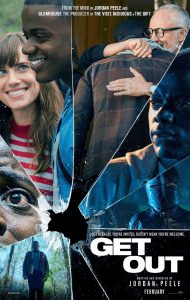Get Out
Posted on February 23, 2017 at 5:44 pm

Two caveats before I begin the review: First, I am not very knowledgeable about horror films and therefore do not have the context I normally bring to evaluating a film. Second and more important, this movie has complex themes about race and privilege that I do not pretend to have authority to speak to. I strongly recommend that people who are interested in understanding this film read the perspectives of critics who are African-American or people of color, and I will post links to some of the ones I especially admire at the end of this review. With those limitations in mind, here are my thoughts on “Get Out,” in my opinion a superb film on many levels.
Writer/director Jordan Peele, like his “Key and Peele” partner Keegan-Michael Key, is biracial, which gives them both a lifelong experience with being both part of and observer of black and white culture and a lifelong fascination with code-switching, as we saw in their film “Keanu,” written by Peele. Moving from comedy to horror, Peele continues to explore the themes, giving depth and emotional power to a genre film. Unlike Quentin Tarantino, who carelessly purloins historic settings as a shortcut to the audience’s emotional investment so he can get right to the gore, Peele cannily plays the conventions of the genre and the discomfort and hostility about race off of each other.
It is one of the most terrifying prospects of ordinary life: meeting the family of the significant other. This familiarly excruciating prospect can be played for comedy (“Meet the Parents”) or drama (“Guess Who’s Coming to Dinner?”), but horror is perhaps its best fit, with room for some comedy and drama as well. The fact that Rose (“Girls” star Allison Williams) has not told her parents that her boyfriend of five months, Chris (Daniel Kaluuya), is black, adds another layer of tension. She assures him it does not matter. “They would have voted for Obama for a third time if they could!”
Kaluuya gives a star-making performance with help from cinematographer Toby Oliver, who makes this that rarest of movies, one that knows how to light African-Americans, especially those with darker skin, so that we can really see what they bring to the role. Watch his face in the early scenes as Chris navigates the fatuous pleasantries of Rose’s parents (Bradley Whitford and Catherine Keener, both excellent), and then the bro-ish thuggery of Rose’s brother, and then the condescending appraisals of the friends who all seem like they are on their way to the yacht club. We see him calibrate each of these interactions, trying to be a good sport, trying to go along, trying to make his girlfriend’s family feel comfortable with him, but starting to lose his patience. One of the film’s many shrewd understandings is the way that a lifetime of having to reassure white people that he is not going to hurt them or make them uncomfortable makes him slow to pick up on or slow to doubt himself about the creepiness of Rose’s family. An early scene, where Chris and Rose get questioned by a highway patrolman after hitting a deer is subtle but sharply drawn. And before you can say “foreshadowing,” Chris is getting a tour of the house and Rose’s dad is explaining that the basement had to be sealed off because of black mold. Hmm. And did I mention the prologue when a black guy walking down a peaceful suburban street is followed and then captured? And that the only person of color beside Chris at the party (the always-great LaKeith Stanfield) is strangely subdued and doesn’t know about fist bumps?
It would be a disservice to say any more about the plot. I won’t spoil the twists. I’ll just say that Peele knows what scares us and how to scare us and make us enjoy it, and gives us a lot to think about about some comedy as well. And that it may be that the scariest thing about the movie is the reminder that it has taken far too long to shine the correct light — literally and figuratively — on stories that should be told because they are just that good.
I recommend these reviews: Travis Hopson, Aisha Harris, Jeffrey Lyles, Kevin Sampson, Stephen Thrasher, Kareem Abdul-Jabbar, and Odie Henderson and Stephen Boone. Also, this piece on conversations with interracial couples who have seen the film.
Parents should know that this is a horror film with theme of racism and exploitation, extended peril and violence including gun, choking, and bloody, graphic, and explicit medical images and sounds, characters injured and killed, suicide, references to sad loss of a parent, some strong language including racist epithets, sexual references and a non-explicit situation, and smoking.
Family discussion: When does the story turn from insensitive to offensive to sinister? What makes Chris decide that he has to leave?
If you like this, try: “Rosemary’s Baby,” “The Wicker Man” (original version) and “The Stepford Wives”
